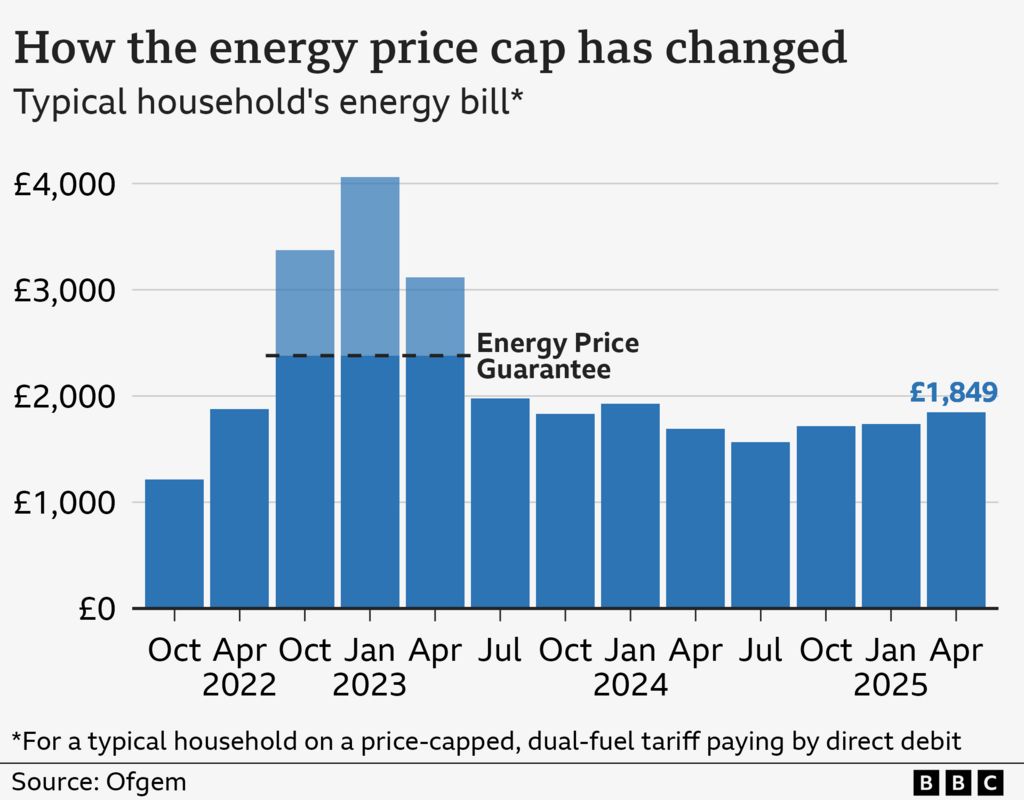Energy bills to rise by more than expected in April
Energy prices will rise by 6.4% in April under regulator Ofgem’s new cap – a higher than expected increase adding pressure on people’s finances.
It means a household using a typical amount of gas and electricity will see their annual bill rise by £111 a year, or £9.25 a month, taking the total bill to £1,849 a year.
The cap, which puts a limit on the amount suppliers can charge for each unit of energy, affects the bills of 22 million homes in England, Wales and Scotland.
Rising wholesale costs are behind the latest price hike, the third consecutive increase in the cap which is set every three months.
Analysts had forecast a 5% rise in prices, before Ofgem’s announcement on Tuesday.
As well as wholesale costs, the regulator said inflation was behind the latest increase.
This will hit people’s finances at the same time as water and council tax increases, although average wages are also going up.
‘Considering fixed deals’
The rise means prices will be 9.4% – or £159 a year – higher than they were in April 2024.
Standing charges – which are fixed fees to connect to a gas and electricity supply – are also going up again for gas but dropping for electricity, with some customers in London and North Wales and Mersey seeing an overall increase of up to £20 a year, although these vary by region.
Jonathan Brearley, Ofgem’s chief executive, said that prices remained a huge challenge for many people and accepted another increase was “unwelcome”.
Mr Brearley said customers, where possible, should consider “switching or fixing tariffs now” to try to lower costs and “provide certainty over coming payments”.
“If anyone is worried about paying their bills, I would urge them to reach out to their supplier to make sure they’re getting all the help they can,” he added.
About four million households have done so in recent months, according to Ofgem figures.
While the cost of each unit of gas and electricity is capped, the total bill is not, so household bills will vary depending on how much energy is used.
The regulator illustrates the cap by showing the impact on the annual bill of a household with typical energy usage.

Bills are about 50% higher than pre-Covid levels, but remain below the peak reached in 2022 when Russia’s full-scale invasion of Ukraine caused energy prices to spike.
Ofgem director general of markets, Tim Jarvis, told the BBC that the latest price rises were being driven by the international price of gas, which he said had gone up “significantly” in the early months of this year.
He said he understood consumers were frustrated and annoyed by the high profits made by some energy firms, but added the price cap was a method Ofgem used to cap those profits.
However, charities said the increase in prices would be a painful blow for billpayers.
Citizens Advice said its research suggested 6.7 million people in England, Wales and Scotland were in debt to their energy supplier. Official figures show nearly £4bn is owed.
“We’re helping people every day who simply can’t afford this latest price hike,” said its chief executive, Dame Clare Moriarty.
“We’re particularly concerned about households with children, where over one in three struggle to afford bills, rising to more than half of those on low incomes.”
The government has announced it is planning to extend the number of people who qualify for the Warm Home Discount scheme next winter – which gives some people on benefits a reduction of £150 from their annual energy bill.
The next change in prices means in April:
The regulator has extended the Debt Allowance Scheme – a charge for all customers to cover the cost of that debt support – until something different is done to deal with the amount of debt being accrued.

How to keep energy use – and bills – down
Experts have shared three tips to keep on top of energy use during the warmer months:
Read more here if you are struggling to pay energy bills
Adblock test (Why?)












